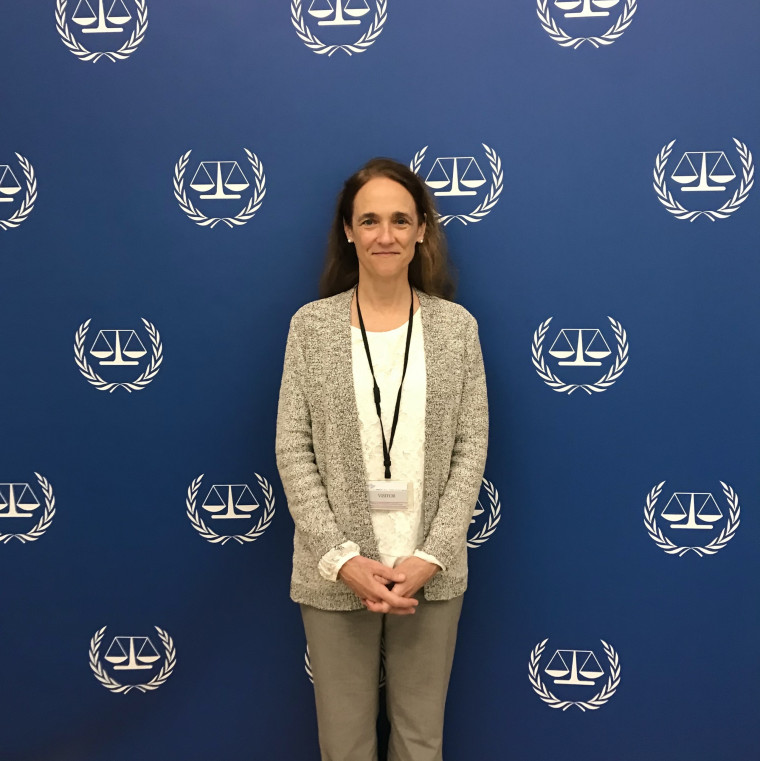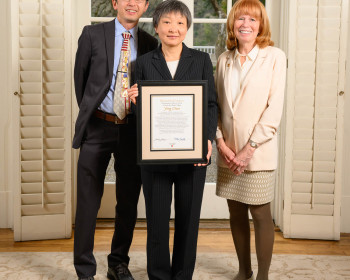Pursuing International Justice for Forced Marriage Victims
Lewis & Clark Law Visiting Professor attended a hearing at the International Criminal Court as a member of her legal team invited to present views to the Judges on a Ugandan warlord’s appeal of his convictions for forced marriage of girls and women and other crimes against humanity.
Open gallery

Visiting Law Professor Kathleen M. Maloney shared her expertise with the International Criminal Court (ICC) in the Hague this February, in a first of its kind appeal regarding groundbreaking convictions for forced marriages of young girls and women.
The ICC is the world’s only permanent, independent tribunal with jurisdiction to investigate and prosecute the core international crimes of genocide, crimes against humanity, war crimes, and aggression. This rare invitation to appear as an expert was spurred by the amicus brief (see related content) Maloney and her co-amici submitted to the Appeals Chamber considering a Ugandan warlord’s appeal of his forced marriage conviction.
Defendant Dominic Ongwen’s conviction in 2021 for forced marriages of young girls and women in the Ugandan armed conflict constituted a major milestone. For the first time, the ICC held perpetrators of this crime accountable. The Ongwen Trial Chamber made further history through its first-ever conviction by any tribunal for forced pregnancy as a crime against humanity.
The Appeals Chamber devoted one day in the week-long February hearing to presentations by Maloney’s co-amici and other teams on Sexual Gender-Based Crimes (SGBC). These gendered crimes included forced marriage, forced pregnancy, and sexual slavery. The Appeals Judges asked amici whether forced marriage qualified as an ‘other inhumane act’ crime against humanity under the Rome (ICC’s) Statute; what its legal elements were; and which protected interests and distinct harms forced marriage involved.
Maloney’s team cited international criminal tribunals arising from the Sierra Leonean civil war and Cambodian genocide whose appellate judges determined that forced marriage resembled, in nature and gravity, other crimes against humanity like enslavement, imprisonment, torture, rape, sexual slavery, and sexual violence. The catch-all “other inhumane acts” category of crimes against humanity was established by the Nuremberg Charter and post-WWII trials, and has crystallized into customary international law. This well-settled basket of unenumerated crimes against humanity recognizes the impossibility of listing or anticipating every possible inhumane act that wrongdoers may invent and inflict on others.
Forced marriage in armed conflict reflects this reality. Abducting young girls from their schools and homes and forcing them into exclusive conjugal unions with soldiers from whom they cannot escape and whose children they are forced to bear and raise is exactly the kind of “other inhumane act” that even the most sadistic minds might fail to envision.
Maloney points out that sexual and gender-based crimes are as old as war itself. “Let us not forget that the Japanese military sexually enslaved women to fuel their war machine in WWII and these euphemistically-called “comfort women” have yet to receive justice or the formal apology from Japan that survivors still seek,” she said.
Maloney also spoke of the memories her visit to the international court engendered: “Being back at the ICC, where I drafted appellate decisions for Chief Judge Navi Pillay, the first female justice on the South African Supreme Court and the former UN High Commissioner of Human Rights, brought back many fond memories. Four of the five Legal Officers I worked with in the Appeals Chamber are still there, 14 years later. I really admire their stamina; many aspects of atrocity cases are mentally and emotionally quite challenging.”
The Appeals Chamber Ongwen Judgment is not expected for many months, but upholding his conviction is one step toward ending impunity for forced marriage, which often maintains and prolongs armed conflict. It will also authorize reparations for these forced marriage victims and their children who suffer severe and long-term physical, psychological, social, economic, and reproductive harms and cultural stigmatization.
The collective of international feminist legal scholars and practitioners that mobilized to bring long-neglected perspectives to the Appeals Chamber for its consideration in the Ongwen case, Maloney reports, plans to continue collaboration in advancing international criminal and human rights law for gender and children’s justice. The war in Ukraine and its impacts on the most vulnerable present urgent opportunities to pursue these efforts. Maloney hopes this terrible crisis will precipitate even greater interest at the law school (and beyond) in international law and institutions promoting peace, security, and human rights for all.
Law Communications is located in room 304 of Legal Research Center (LRC) on the law Campus.
MSC: 51
email jasbury@lclark.edu
voice 503-768-6605
Cell: 626-676-7923
Assistant Dean,
Communications and External Relations, Law School
Judy Asbury
Law Communications
Lewis & Clark Law School
10101 S. Terwilliger Boulevard MSC 51
Portland OR 97219

